Healthy high-fat foods have gained popularity for their potential health benefits.
While the idea of eating high-fat foods may seem counterintuitive to a healthy diet, research has shown that incorporating healthy fats into your diet can have numerous benefits.
Understanding the different types of healthy fats and their sources can help you make informed choices about the foods you consume.
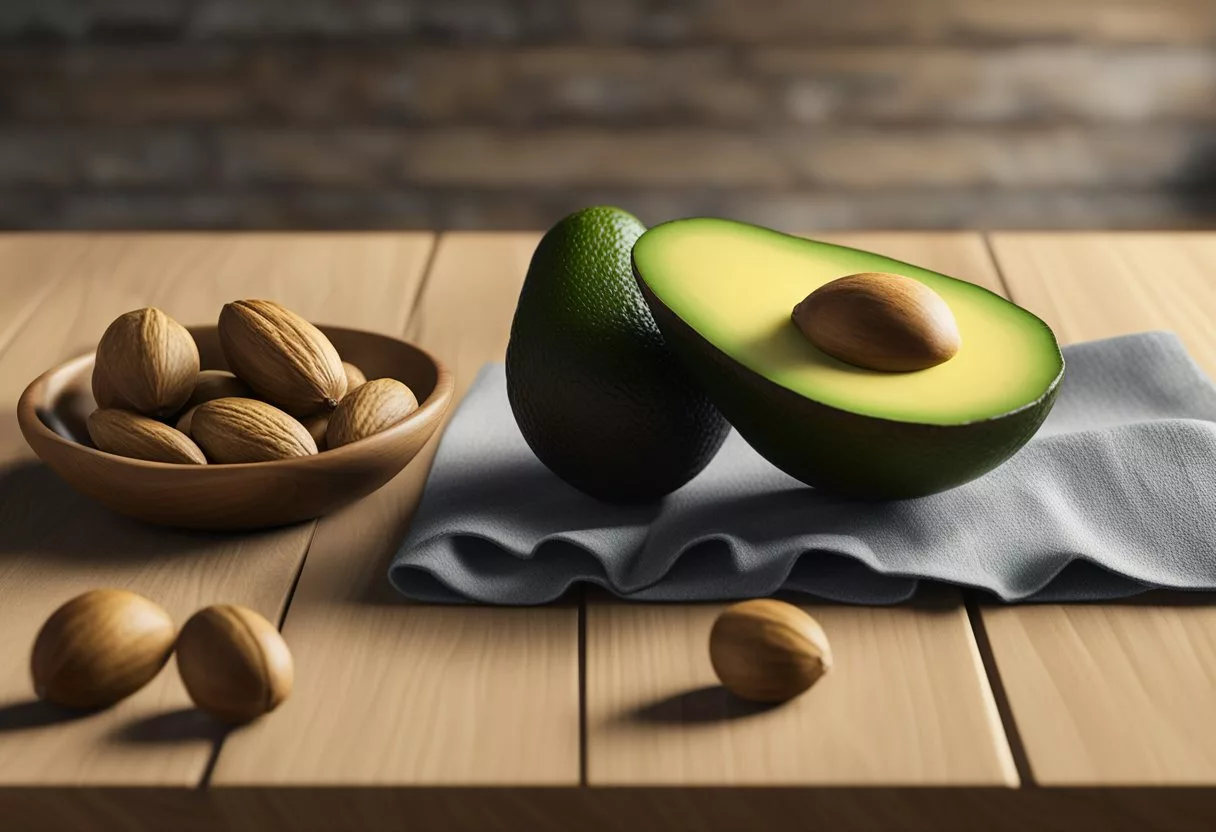
Healthy fats are a type of nutrient that is essential for the body to function properly. They help to build cell membranes, support brain function, and regulate hormone levels.
While there are different types of healthy fats, monounsaturated and polyunsaturated fats are considered the healthiest. These fats can be found in foods like nuts, seeds, avocados, and fatty fish.
Healthy high-fat foods can have numerous benefits, including reducing the risk of heart disease, diabetes, and obesity.
Additionally, healthy fats can help to improve brain function, boost energy levels, and promote healthy skin and hair.
By understanding the different sources of healthy fats and their nutritional profiles, you can make informed decisions about the foods you consume.
Key Takeaways
- Healthy high-fat foods are essential for the body to function properly.
- Monounsaturated and polyunsaturated fats are considered the healthiest types of healthy fats.
- Incorporating healthy high-fat foods into your diet can have numerous benefits, including reducing the risk of heart disease, diabetes, and obesity.
Understanding Healthy Fats
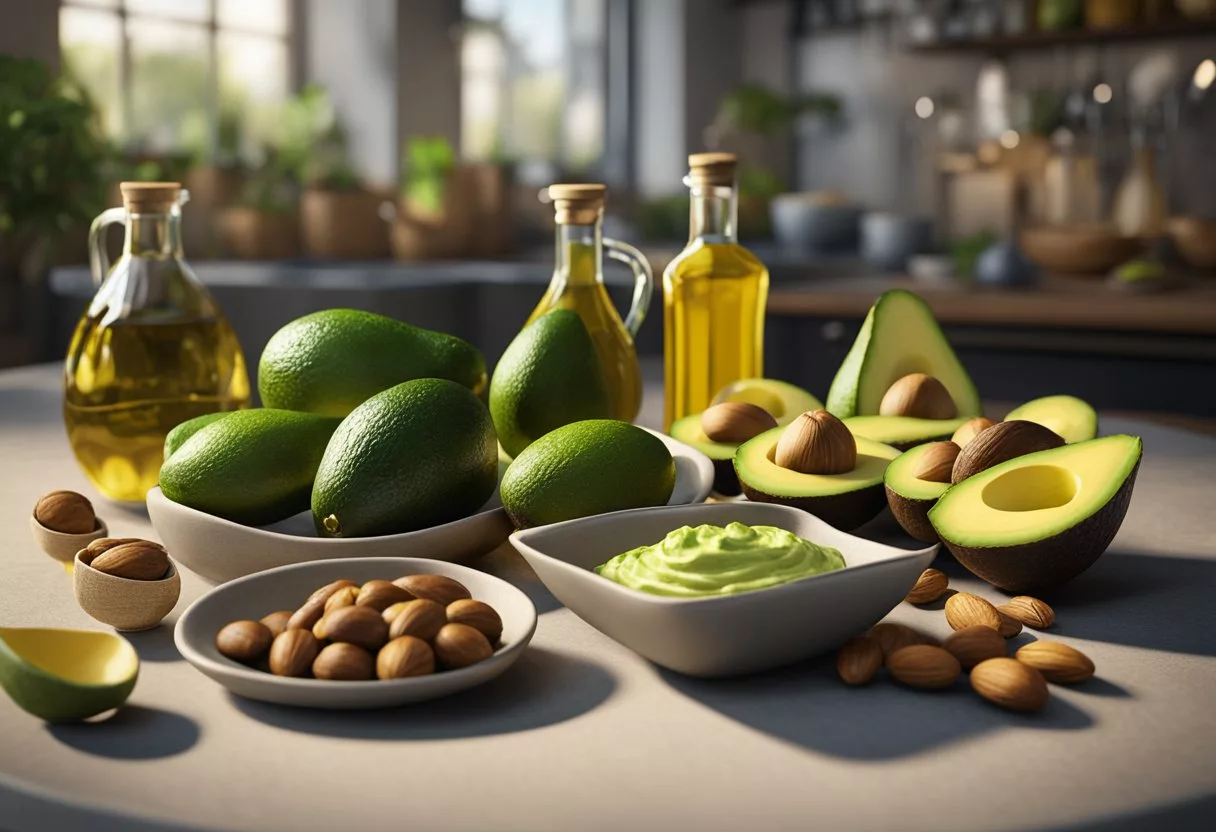
Types of Dietary Fat
Dietary fat is one of the three macronutrients that provide energy to the body.
There are three main types of dietary fat: saturated, unsaturated, and trans fats.
Saturated fats are typically solid at room temperature and are found in animal products such as meat, cheese, and butter. Unsaturated fats, on the other hand, are typically liquid at room temperature and are found in plant-based foods such as nuts, seeds, and oils.
Monounsaturated and polyunsaturated fats are two types of unsaturated fats. Trans fats are a type of unsaturated fat that is created through a process called hydrogenation and is commonly found in processed foods such as baked goods, fried foods, and snack foods.
Role of Fats in Nutrition
Fats play an important role in nutrition by providing energy, aiding in the absorption of certain vitamins, and helping to maintain healthy skin and hair. They also help to insulate and protect organs and serve as a source of essential fatty acids that the body cannot produce on its own.
Misconceptions About Fat
There are many misconceptions about dietary fat, particularly saturated fat.
While it is true that consuming too much saturated fat can increase the risk of heart disease, it is important to note that not all fats are created equal.
Unsaturated fats, particularly monounsaturated and polyunsaturated fats, have been shown to have a positive impact on heart health when consumed in moderation.
Additionally, the body needs some dietary fat to function properly, and a diet that is too low in fat can lead to nutrient deficiencies and other health problems.
It is important to note that not all fats are created equal. The type of fat, as well as the amount consumed, can have a significant impact on health.
For example, while trans fats are known to increase the risk of heart disease, monounsaturated and polyunsaturated fats have been shown to have a positive impact on heart health when consumed in moderation.
Benefits of High-Fat Foods
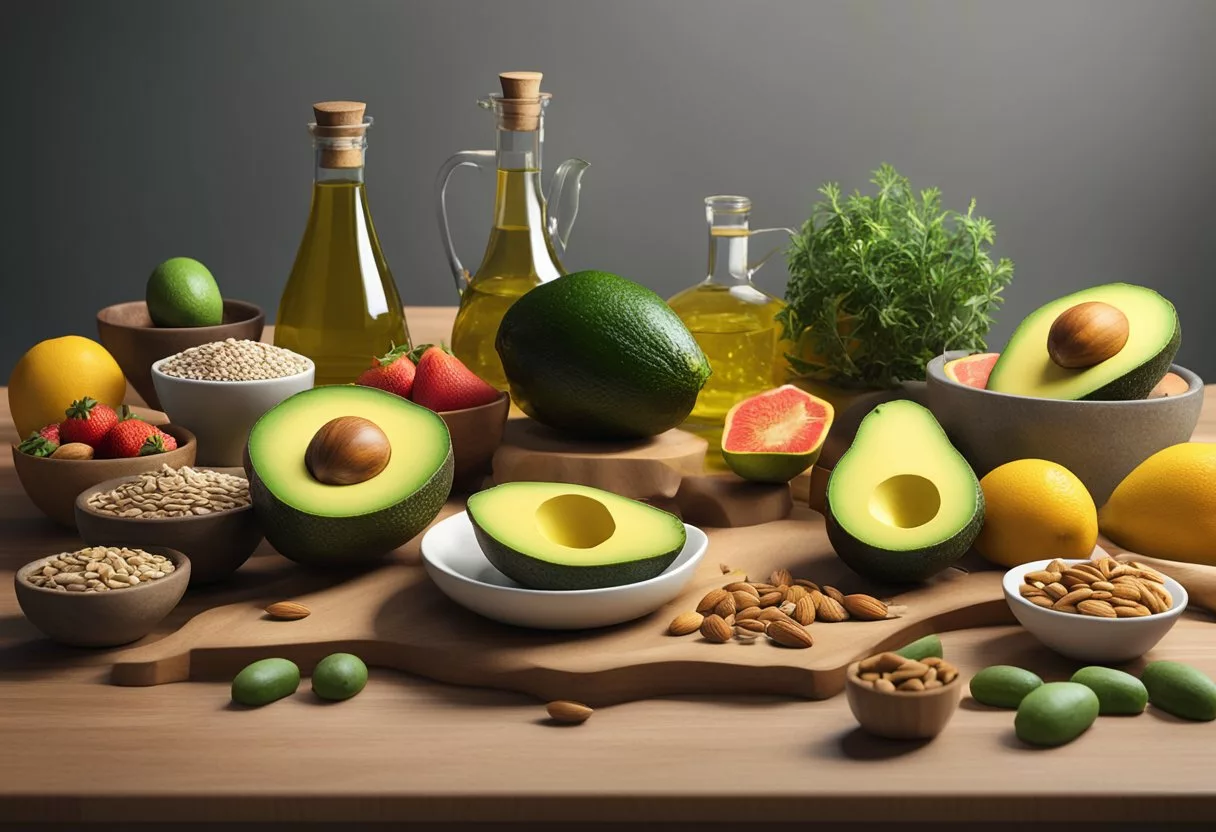
Consuming healthy high-fat foods can provide numerous benefits to the body.
Contrary to popular belief, not all fats are bad for health. In fact, many high-fat foods contain healthy fats that are essential for optimal body function.
Heart Health and Fats
Healthy fats, such as monounsaturated and polyunsaturated fats, have been shown to have heart-healthy benefits.
A diet rich in these fats has been linked to a reduced risk of heart disease, lower blood pressure, and improved cholesterol levels.
Omega-3 fatty acids, found in fatty fish and certain nuts and seeds, have been shown to have anti-inflammatory properties and can also help lower triglyceride levels.
Weight Management and Satiety
Including healthy high-fat foods in a balanced diet can also aid in weight management.
Foods high in healthy fats tend to be more satiating, meaning they can help keep you feeling full for longer periods of time. This can lead to a reduction in overall calorie intake and ultimately aid in weight loss.
Cognitive and Hormonal Benefits
Healthy fats also play a vital role in brain function and hormone production.
Omega-3s, in particular, have been shown to improve brain function and may even help reduce the risk of certain neurological conditions.
Additionally, healthy fats are essential for the production of hormones such as testosterone and estrogen.
Sources of Healthy High-Fat Foods
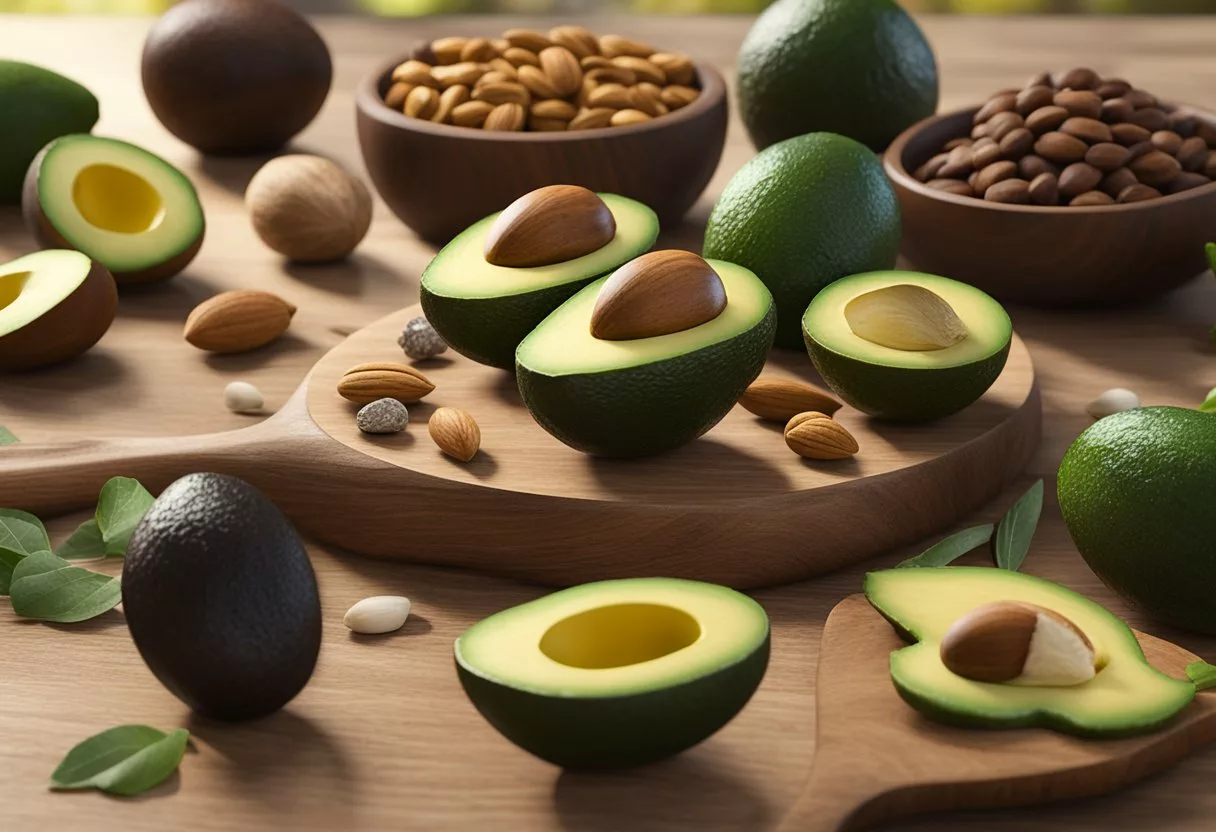
Eating a diet rich in healthy fats can provide numerous health benefits. This section will explore some of the best sources of healthy high-fat foods.
Nuts and Seeds
Nuts and seeds are a great source of healthy fats, fiber, and protein.
Some of the best options include almonds, walnuts, chia seeds, and flaxseeds.
These foods are also rich in important nutrients like vitamin E, magnesium, and selenium.
Fatty Fish and Seafood
Fatty fish and seafood are another excellent source of healthy fats.
Some of the best options include salmon, mackerel, herring, tuna, anchovies, and sardines.
These fish are rich in omega-3 fatty acids, which have been shown to reduce inflammation and improve heart health.
Plant-Based Oils
Plant-based oils like olive oil and extra-virgin olive oil are a great source of healthy fats.
These oils are high in monounsaturated and polyunsaturated fats, which have been shown to improve cholesterol levels and reduce the risk of heart disease.
Dairy and Eggs
Dairy products and eggs are a good source of healthy fats, protein, and important nutrients like calcium and vitamin D.
Some of the best options include full-fat yogurt, cheese, and butter.
It’s important to note that while these foods are high in healthy fats, they should be consumed in moderation due to their high calorie and saturated fat content.
Avocados and Olives
Avocados and olives are both excellent sources of healthy fats.
Avocados are high in monounsaturated fats and are also a good source of fiber and potassium. Olives are high in healthy fats and are also a good source of antioxidants.
Incorporating Healthy Fats into Your Diet
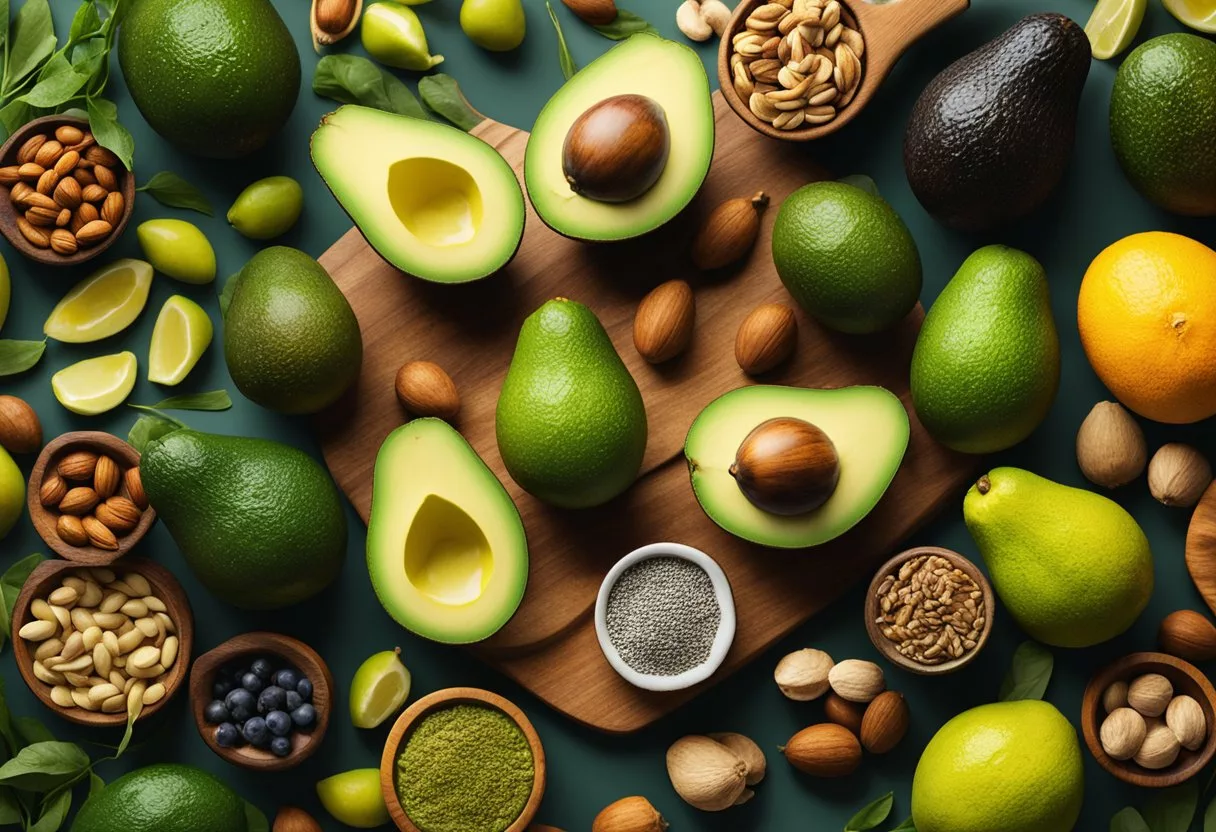
Consuming healthy fats is essential for maintaining a balanced diet. Incorporating high-fat foods into your meals can help you feel fuller for longer, promote digestive health, and provide essential nutrients like omega-3 and omega-6 fatty acids. Here are some tips for incorporating healthy fats into your diet:
Meal Planning with High-Fat Foods
When planning your meals, aim to include a variety of healthy fats. This can include foods like fatty fish, nuts, seeds, avocados, and olive oil.
A Mediterranean-style diet, which emphasizes healthy fats, is a great way to ensure you’re getting enough of these beneficial nutrients.
To make meal planning easier, consider prepping ingredients ahead of time. For example, roasting a batch of nuts or cooking a large portion of salmon can provide you with healthy fat options to incorporate into your meals throughout the week.
Healthy Cooking and Preparation Methods
When cooking with high-fat foods, it’s important to use healthy cooking methods.
Avoid deep-frying or cooking with excessive amounts of oil, as this can negate the health benefits of the food.
Instead, try baking, roasting, or grilling your high-fat foods.
These methods can help preserve the nutrients in the food while still providing a delicious and healthy meal.
Balancing Fats with Other Macronutrients
While healthy fats are important, it’s also important to balance them with other macronutrients like protein, fiber, and carbohydrates.
Aim to include a variety of nutrient-dense foods in your meals, such as fruits, vegetables, whole grains, and lean proteins.
When incorporating high-fat foods into your meals, consider pairing them with other healthy foods.
For example, adding avocado to a salad with grilled chicken and quinoa can provide a balanced and satisfying meal.
Nutritional Profiles of High-Fat Foods

Vitamins and Minerals in Fats
Contrary to popular belief, fats are not just a source of calories. They also contain essential vitamins and minerals that are important for overall health.
For example, nuts and seeds are rich in magnesium, which is important for bone health and muscle function. Avocados are a good source of potassium, which is important for regulating blood pressure and heart health. Fatty fish like salmon and tuna are high in vitamin D, which is important for bone health and immune function.
Fiber and Protein Content
While high-fat foods are not typically thought of as good sources of fiber and protein, some do contain significant amounts of these important nutrients.
For example, chia seeds are high in both fiber and protein, making them a great addition to smoothies and oatmeal. Nuts and seeds also contain fiber and protein, although the exact amount varies depending on the type of nut or seed.
Understanding Omega-3 to Omega-6 Ratios
One of the most important things to consider when consuming high-fat foods is the ratio of omega-3 to omega-6 fatty acids.
While both types of fatty acids are important, most people consume too much omega-6 and not enough omega-3. This imbalance has been linked to inflammation and a variety of chronic diseases.
Fatty fish like salmon and sardines are high in omega-3 fatty acids, while nuts and seeds are higher in omega-6 fatty acids.
It is important to consume a variety of high-fat foods to ensure a healthy balance of both types of fatty acids.
Health Considerations and Risks
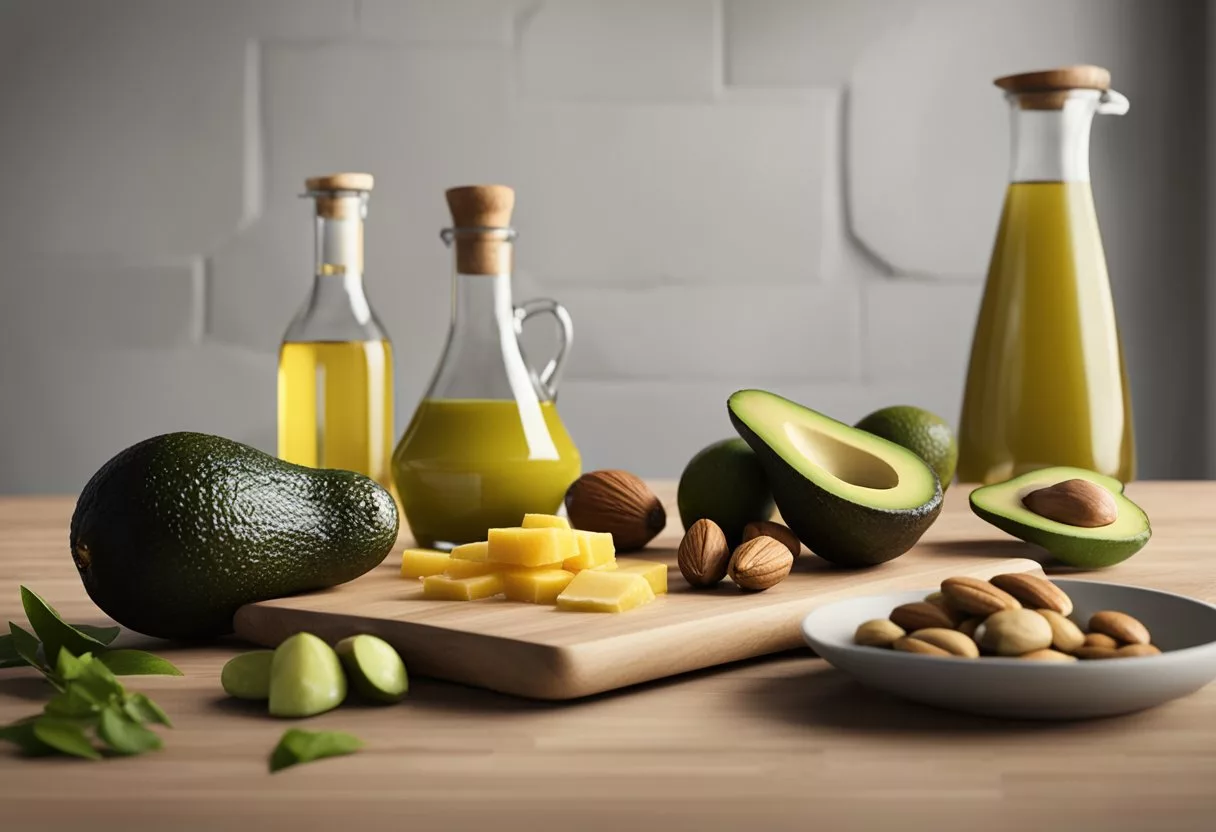
Managing Cholesterol and Saturated Fats
While some high-fat foods can be healthy, others can be high in saturated fats, which can increase cholesterol levels and the risk of heart disease.
To manage cholesterol levels, limit the intake of saturated and trans fats. Saturated fats are commonly found in animal products such as meat, butter, and cheese. However, there are also plant-based sources of saturated fats, such as coconut oil and palm oil.
To manage cholesterol levels, it is recommended to choose foods that are high in unsaturated fats, such as fatty fish, nuts, and seeds.
These foods can help to reduce inflammation and the risk of chronic diseases such as heart disease and type 2 diabetes.
Impact of Trans Fats and Processed Foods
Trans fats are a type of unsaturated fat that is commonly found in processed foods. They can increase cholesterol levels and the risk of heart disease.
It is important to limit the intake of trans fats by avoiding processed foods and choosing foods that are high in unsaturated fats.
Processed foods are also often high in salt, sugar, and unhealthy fats. They can contribute to inflammation and the risk of chronic diseases such as cancer, diabetes, and heart disease.
It is important to choose whole, unprocessed foods whenever possible.
Allergies and Intolerances to High-Fat Foods
Some people may have allergies or intolerances to high-fat foods. For example, some people may be allergic to nuts or have an intolerance to lactose.
It is important to be aware of any food allergies or intolerances and to avoid foods that may trigger a reaction.
Special Diets and High-Fat Foods
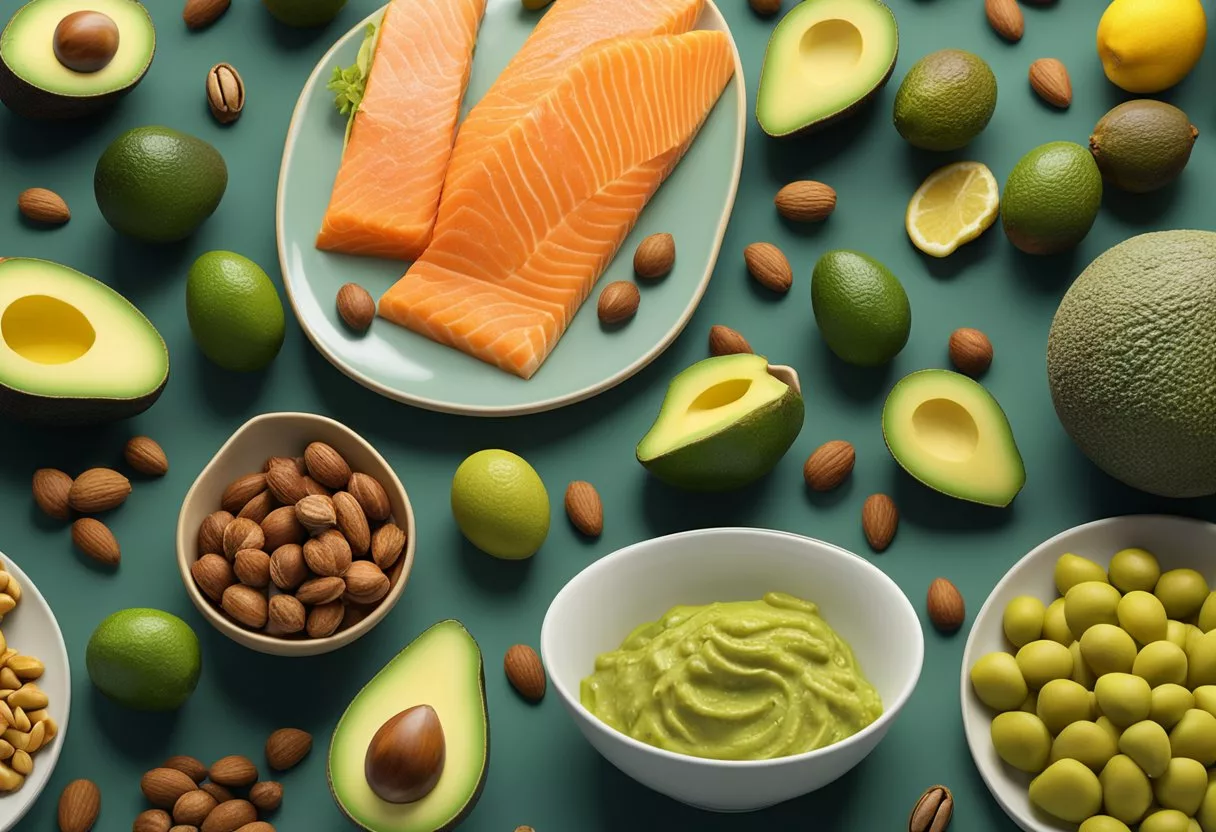
Ketogenic Diet and High Fat Intake
The ketogenic diet is a high-fat, low-carbohydrate diet that has gained popularity in recent years. It involves consuming a diet that is high in healthy fats and low in carbohydrates, which puts the body into a state of ketosis.
This state allows the body to burn fat for energy instead of glucose, resulting in weight loss and improved health markers.
Some healthy high-fat foods that are suitable for a ketogenic diet include avocados, nuts and seeds, fatty fish, and olive oil.
These foods are excellent sources of healthy fats and can help individuals maintain a healthy weight while following a ketogenic diet.
Vegan and Vegetarian Sources of Healthy Fats
Individuals who follow a vegan or vegetarian diet can also consume healthy high-fat foods to maintain their health.
Some excellent sources of healthy fats for vegans and vegetarians include nuts and seeds, avocados, coconut oil, and olive oil.
These foods are rich in healthy fats and can provide the body with the necessary nutrients to maintain optimal health.
High-Fat Foods in Gluten-Free Diets
Individuals who follow a gluten-free diet can also consume healthy high-fat foods to maintain their health.
Some excellent sources of healthy fats for individuals following a gluten-free diet include nuts and seeds, avocados, olive oil, and coconut oil.
These foods are rich in healthy fats and can provide the body with the necessary nutrients to maintain optimal health.
Frequently Asked Questions

What are the best sources of healthy fats for weight loss?
Healthy fats can help with weight loss by keeping you feeling full and satisfied.
Some of the best sources of healthy fats for weight loss include avocados, nuts and seeds, fatty fish like salmon, and olive oil.
These foods are also nutrient-dense, providing a range of vitamins and minerals that can support overall health.
Which fats are considered the healthiest for human consumption?
The healthiest fats for human consumption are unsaturated fats, including monounsaturated and polyunsaturated fats.
These fats can help lower cholesterol levels and reduce the risk of heart disease when consumed in moderation. Good sources of unsaturated fats include nuts, seeds, avocados, and fatty fish.
What are some common high-fat foods that should be avoided for better health?
Some common high-fat foods that should be avoided for better health include processed foods like fried foods, fast food, and packaged snacks.
These foods are often high in unhealthy fats, like saturated and trans fats, which can increase the risk of heart disease and other health problems.
How do healthy fats benefit overall well-being?
Healthy fats provide a range of benefits for overall well-being, including supporting brain function, reducing inflammation, and improving heart health.
They can also help with weight management by keeping you feeling full and satisfied.
Can you list fat-rich foods that are beneficial for a morning meal?
Fat-rich foods that are beneficial for a morning meal include avocado toast, eggs cooked in olive oil, and a smoothie made with nut butter and coconut milk.
These foods can provide sustained energy throughout the morning and help keep you feeling full until lunchtime.
What vegetables are high in beneficial fats?
Most vegetables are low in fat, but some have more beneficial fats than others. Good options include avocado, olives, and coconut.
You can use them as ingredients in salads or as toppings for other dishes. Additionally, some leafy greens like kale and spinach contain small amounts of healthy fats.
